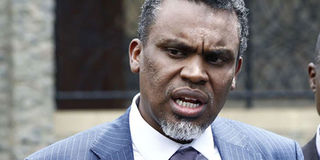Joint DCI, DPP team tasked with unravelling dams saga

Director of Public Prosecutions Noordin Haji. PHOTO | FILE | NATION MEDIA GROUP
What you need to know:
Deputy President William Ruto and Elgeyo Marakwet Senator Kipchumba Murkomen have been critical of the investigations noting that money has not been lost.
At one point Mr Ruto and Mr Rotich differed over the amount paid.
Mr Haji says that close to Sh21 billion has since been paid to contractors despite the law having been violated.
Director of Public Prosecutions (DPP) Noordin Haji has constituted a team of prosecutors to work closely with the Directorate of Criminal Investigations (DCI) in unravelling the truth behind the alleged loss of billions of shillings in the construction of dams.
This comes as Mr Haji noted that he is shocked by the magnitude of the amounts involved and the range of parties that are of interest to the investigations.
“This has in turn made investigations complex requiring investigators to cover a wide range of areas that includes tendering process, discrepancies in the identities of the parties that bid for the tenders, the winners, those granted the tenders and the executors of the agreements,” Mr Haji said in a statement on Friday evening.
The billions are feared to have been lost through manipulation of the tendering process and suspicious payments for the construction of several dams — Embobut Multi- Purpose Dam, Kimwarer, lower Turkwel irrigation scheme, Arror Dam and the Napuu II irrigation project.
ROTICH QUIZZED
The constitution of the team by the DPP comes as Treasury Cabinet Secretary Henry Rotich was quizzed by the DCI officers for three days running over the Sh65 billion Arror and Kimwarer dams, whose tendering and award are shrouded in suspicious dealings.
“I have been persuaded that the complaints lodged were not without merit and the evidence so far suggests that the breaches of the law emerging and their consequences merit intense and thorough investigations,” Mr Haji says in a statement to the newsrooms.
Deputy President William Ruto and Elgeyo Marakwet Senator Kipchumba Murkomen have been critical of the investigations noting that money has not been lost.
At one point Mr Ruto and Mr Rotich differed over the amount paid. Whereas Mr Ruto said that ‘only’ Sh7 billion had been paid for construction of Kimwarer and Arror dams, Mr Rotich noted that close to Sh21 billion had actually been paid.
INTERNATIONAL COOPERATION
Mr Haji says that close to Sh21 billion has since been paid to contractors despite the law having been violated.
“More crucially, we must get a handle on more than Sh21 billion that has already been paid so as to trace and establish any intended corrupt payments. This means that an aspect of international cooperation shall be necessary in unearthing the true identity of the persons behind the entities fronted in the agreements,” the DPP says.
Mr Ruto and Mr Murkomen have also gone to the extent of accusing political adversaries of sabotaging the government projects.
But Mr Haji has promised that the probe is being handled professionally devoid of any witch hunt, political considerations or any other extraneous matters.
LAW FLOUTED
Of interest to the investigators is the fact that tenders for the construction of the dams were awarded in the absence of project designs contrary to the Public Procurement and Asset Disposal Act, attempts to manufacture designs post fact and failure to secure land required for the projects.
There is also the disputed status of ownership of the project land, failure to compensate the affected persons, absence of any recorded handover of the sites and the involvement of large number of government officers in entire project.
The DPP has also raised the legal status of the alleged contractors and their financial status in their home country and the contractors’ involvement in the allegations of fraud in their home country.
The DPP has equally directed that financial investigations that may lead to identification of any properties that are proceeds of crime be given a top priority.
This is to ensure that any ensuing prosecutions will not only be limited to securing convictions against perpetrators of fraudulent activities but also predicated upon recovery of public funds improperly expended.




